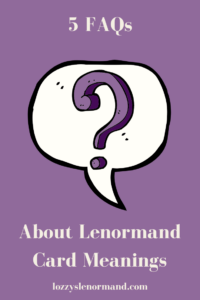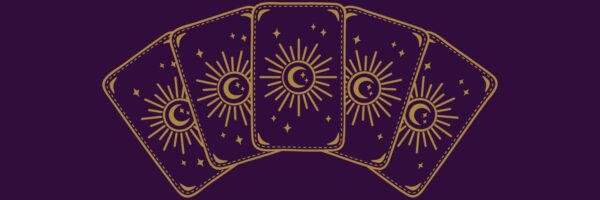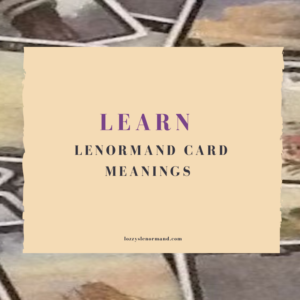 Lenormand card meanings and which one is “right” and who is doing Lenormand the “correct” way and who isn’t can, as you may have found, be a bit of an issue in any Lenormand community you might find yourself in or when you’re doing your readings.
Lenormand card meanings and which one is “right” and who is doing Lenormand the “correct” way and who isn’t can, as you may have found, be a bit of an issue in any Lenormand community you might find yourself in or when you’re doing your readings.
And people, as you may have found, can get very defensive, purist and het up about “their” meanings (or the meanings they have learned), even sometimes to the point of rudeness to anyone who doesn’t do things exactly the way they do. Why so?
First, let’s get a bit of perspective here. As I’ve said before, it’s not brain surgery or nuclear fusion. It’s card reading and fortune telling, based on an 18th century parlour game which probably arose out of a number of other divination and oracle card traditions.
Sure, there is a background to it and a shared history, so it’s worth knowing that to get some context, and the meanings and methods aren’t just totally random or totally intuitive/make them up on the spot, but I think partly what this sort of response, if you come across it, comes down to is the human need for certainty and control. (Some people more than others!)
Can we truly know our futures? Can we control them and plan our lives this way? Are there universal rules to these things by which we all have to live? And don’t we all want to be ‘the one’ with that special knowledge or power, the one with all the answers?
But this, of course, leads to various questions and conundrums, so here, I’m going to look at some of the biggest questions & issues that come up with regard to Lenormand Card Meanings and give my thoughts on those.
1. How Can I Be Sure Beforehand Which Card Meaning Is Going To Be THE Right One?
This is a big one, and probably at the heart of most of the anxiety about who has the “right” answers and “right” meanings. The good news is, most of the meanings are, at root, with one or two exceptions, fairly consistent over regions, particularly if you’re doing readings with small numbers of cards.
The first question though is, what do you mean by “right”? The one that will lay out your exact future for you and that you can base all your decisions on? The one that provides you with the answer to your question in your situation? The one that gives you the best bit of advice? The thing you need to know or consider even if it mightn’t be what you want to hear? The one best to give you clues for exploration? So the purpose you are using the cards for will influence the response to that question. See here for some subtle differences in approach and their pros and cons in how you can use your cards.
So really, the question is “How can I be sure which meaning is right for my situation and purpose?”
Okay. Well, I would say that number one, practice makes perfect. Learn the meanings, and learn how they differ across regions. Think about underlying meanings and applications. Experiment. See what seems to work for you and be useful and what doesn’t. Keep a journal. Do small predictions, see how they went. Try different ways of reading, as in the examples in the post above. Experiment with, say, strictly traditional Grand Tableaus and meanings and look back, see how they want, and then try alternate ways. Get a feel for your cards and how they work for you. Remember: confidence takes time.
You can find out more on this topic here:
How Do I Know Which Meanings & Methods Are Correct?
Also, don’t take it too seriously, especially at first. You shouldn’t be basing your whole life on card predictions; treat it as more of an experiment, a game, something to be curious about, to try and to explore. Have fun with it!
2. How Can It Be Up To Me Which “School” Of Meaning I Choose?
I understand why people like me saying it’s okay to do this might seem confusing , a bit handwavey or somehow “inauthentic” but the two questions to ask yourself here, really, are, “Where do I think the meanings come from?” and again “What are they for?”
As I say, you’ll find that MOST of the card meanings stay pretty much the same in essence across regions and from traditional to modern. Where there are variations, they are mostly to do with cultural or historical variations or emphasis on certain aspects of the cards’ symbols over others. See my post on traditional meanings here as well as this one here about different traditions.
And when you think more deeply about it, where do you think the meanings themselves may have come from? Is there a panel of ethereal spirit beings out there in the beyond who decide what each symbol “officially” means and then transmit that to a designated elite of card readers? Or is it more likely, do you think, that readers and diviners over the ages have found a common & meaningful language of symbols based on the things around them? Personally, I think the latter. It’s human nature to see patterns in symbols, and human nature to want to find out what’s in store for us in our lives. It helps give our lives meaning. Many of the symbols used will naturally tend to be universal, but some cultures will emphasise or interpret things slightly differently from others.
What are they for? Well, Lenormand started life as a game based fundamentally on storytelling for divination purposes, using groups of cards with familiar symbols on them. The reader is therefore an active participant in putting the story of the cards together in a way that makes sense and is meaningful to themselves or whoever they are reading for.
Now, you may have your own theories about how or why it ‘works’, but suppose you believe that divination ‘works’ through, say, the universe or spiritual forces giving you a message through the symbols on the cards, or you ‘dipping in’ to a stream of knowledge using the cards as a tool.
Would the “right” message to you be more likely to be provided to you via YOUR understanding of the symbols and how YOU use them or are they completely fixed by some outside force and if you don’t understand them, tough? I think the former, personally, but then that relies on my personal philosophy of life. What’s yours and what do you think? Could the “correct” meanings therefore be a little chicken and egg? If I always use the Lily, say, to mean age and experience, won’t it start turning up that way in my readings?
3. Argh! I Don’t Get Which Cards To Use For Work!
One of the problems with “Work” and “Career” as a concept with regard to Lenormand is that you will find that there are big regional variations in which cards get designated as the “work” card. In some areas, the Anchor, others, the Moon, others, solely modern, the Fox. The reason is there wasn’t really a designated card for “work” in the sense we’d use it now, but there are reasons you might choose to use any of these
Why?
Well, you’ve got to think about the history of the cards and the history of the concept of work itself, or where money came from. Do you think in the 18th and 19th century parlours and coffee houses of European ladies and gentlemen people were worried about their careers and day jobs in the way we would see them now? These card games weren’t generally designed for blacksmiths and farmworkers. The sort of people who used them in polite society were people who might be making money from trade, early industrialists, inheriting wealth. Hence so many of the meanings are to do with “wealth from trade” or maritime enterprises or just more nebulous “good fortune”.
Which leads us again to how “pure” traditional meanings actually are, and how we can apply them to more modern contexts. Some interpretations focus more on the vocational aspect of work (the Moon), some on the day to day stability it brings (Anchor), and some modern French writers on redeeming a much maligned survivalist with all the street smarts as a working class hero (Fox). Which will suit us best? Sometimes, it depends on our situation and the underlying meaning of the card as to which would best apply. In a large reading like a Grand Tableau, why not look at different aspects of our working lives through different cards to get a broader picture from different angles?
4. A Number Of Cards Seem To Have The Same Or Similar Meanings. How Do I Tell The Difference?
It can take a bit of time to really get to know the cards and some of the more subtle differences between them. Often, it really is that subtlety that makes all the difference in your live readings.
For example, you might look at the surface meanings for cards that generally mean good things and go, “Ok, well the Sun means good fortune, so does the Clover AND the Bouquet, and the Stars, so what gives? How are they different?”
The trick is to really try and get underneath, to the essence of each of the cards. The Sun puts a deep golden glow on everything it touches; the Clover’s effect is usually brief and happens by chance; the Bouquet evokes lightness, prettiness and pleasantry; the Stars suggest guidance, reaching as far as. you can possibly go. These would be slightly different influences in your readings.
For more on differences between cards where the meanings seem similar, I looked at this very issue here:
What’s The Difference? Meanings For Cards That Often Get Confused.
5. How Can I Find The Meanings That Make Sense In My Situation?
This is where you really start getting to know your cards and get fluent with them. Again, this takes time to master but here are some tips:
- Remember first of all that Lenormand is at hearta storytelling system using symbols. Sometimes, although it’s useful to do so step by step, I think we can get a little uptight about reading methods and forget that it was a more naturalistic storytelling system to begin with. I mean, in the original Game of Hope, the only instruction about how to read the cards together as a fortune was to spin a “jocular tale” from the cards for the amusement of the assembled company. I cover the common issue of how to string the cards together in How Do I Put A Story Together That Makes Sense?
- Again, really try to get to the essence or heart of each card and then apply those to your situation or question. Take a look at Why Context Is Important In Lenormand
- It’s also worth remembering that meanings will be impacted by several different elements in a live reading, including the context, the question you asked and the surrounding cards. Check out 4 Factors That Affect Card Meanings In A Reading for more detail on this topic.
Want To Know More About Lenormand Card Meanings?
Get The Course!
Want to get beyond the lists, get in depth with the card meanings AND how to use them in practical readings?
My self-directed online Learn Lenormand Card Meanings course does just that, and looks at the “regional” variations you may find, as well as the traditional “Philippe Lenormand” card meanings.
With videos, new worksheets & materials, you’ll be able to learn Lenormand card meanings step by step at your own pace
Do You Need More Guidance?
My Lenormand Tips page has links to a great many articles and Lenormand FAQs for more tips about common issues and problems.
You can also use the SEARCH box above to search common topics: you’ll generally find I have covered a lot of them in detail already!
If you DON”T find what you need on the blog, and you still have questions, you can let me know what Lenormand topics or areas you have difficulty with that you’d still like me to cover by clicking on the link to the survey below.
For a FREE card combinations PDF E-Book, sign up to my mailing list for monthly newsletters and other freebies (be sure to check ALL your mailboxes to pick it up! And mark me as a safe sender if you don’t want to miss out on stuff.) If you don’t want to sign up, it’s also available in both paperback and ebook format from Amazon as well as other ebook platforms.
Also, my Complete Guide to Lenormand paperback is now available from Amazon! You can also get it in ebook format from Amazon, Kobo, Barnes & Noble, Apple Books & other ebook platforms and all my ebooks are also available as downloadable/printable PDFs here in the SHOP!



Thanks, Lozzy. I struggled for a long time, wondering what was the “right” method. Your explanation makes so much sense and since I bought your book and have followed your methods, I’ve had so much more fun and enjoyment from using the cards. It has been far less stressful, and your book has been the most helpful of all to me. I just love it! Good luck with your course, I’m sure it will be a hit, and I’m thinking of signing up! X